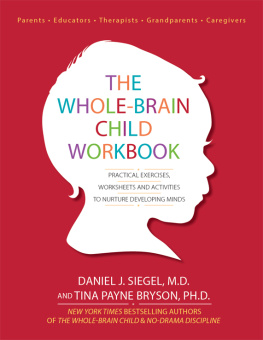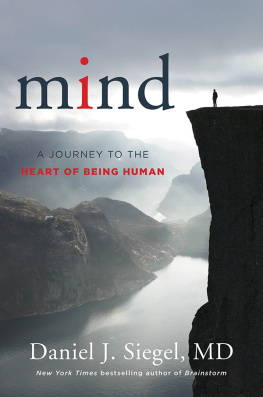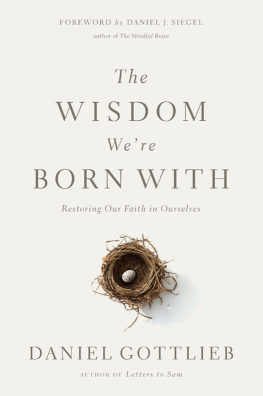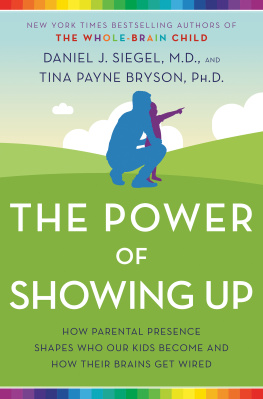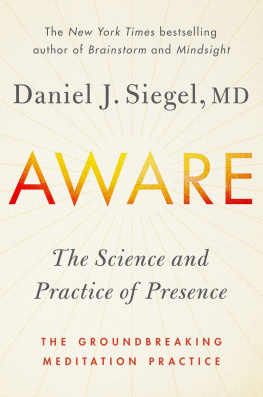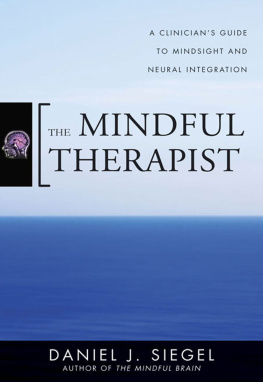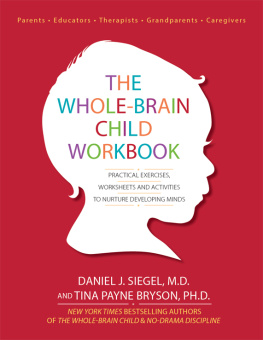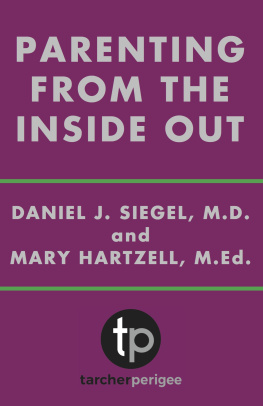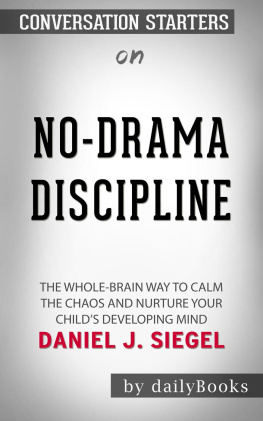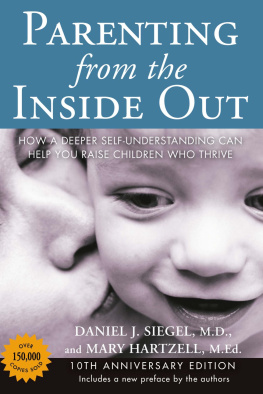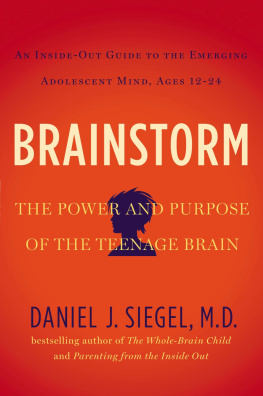The
Whole-Brain
Child
Workbook
Practical Exercises, Worksheets and Activities
To Nurture Developing Minds
Daniel J. Siegel, M.D., and
Tina Payne Bryson, PH.D.
Copyright 2015 by Mind Your Brain, Inc, and Tina Payne Bryson, Inc.
All rights reserved.
Published by
PESI Publishing & Media
3839 White Ave
Eau Claire, WI 54703
Printed in the United States of America
ISBN: 978-1-9361287-4-7
L IBRARY OF C ONGRESS C ATALOGING - IN -P UBLICATION D ATA
Siegel, Daniel J., 1957
The whole-brain child workbook : practical exercises, worksheets and activities to nurture developing minds / Daniel J. Siegel, M.D. & Tina Payne Bryson, Ph.D.
pages cm
ISBN 978-1-936128-74-7 (alk. paper) 1. Parenting. 2. Child development. 3. Child psychology. 4. Child rearing. I. Bryson, Tina Payne. II. Title.
HQ755.8.S53275 2015
306.874--dc23 2015000374
Illustrations by Tuesday Mourning
Layout Design: Matt Pabich
Cover Design: Amy Rubenzer

Contents
A MESSAGE FROM DAN AND TINA:
We want to express our profound admiration that youve decided to even open this book. Were both parents, so we know how hard it is sometimes just to get through a day, much less read a book about parenting. And now, youve decided not only to read a book about parenting, but to explore a workbook about a book about parenting! We greatly respect the commitment youre making to nurture your children and the health of your familyas well as yourself.
Weve written this workbook for you: the busy, possibly overwhelmed but still committed parent who wants to understand at an even deeper level what it means to connect with your children. Maybe youre reading it on your own, or as a part of a group. Maybe youre not even technically a parent, but you want to better understand and relate to the kids you care about. Maybe you are a parent educator and youre using this book to lead a group to greater insight and application of the Whole-Brain approach. Whatever your situation, this workbook is for you.
In the following pages, where we ask you to write, we ask for only a few lines worth. (You can of course write more if youd like.) Writing things down is a proven way to deepen and broaden your understanding, and its a great way to make sense of what youve been doing and how you might consider doing things even better. Weve given you various activities you can do on your own and/or with your kids, but these are absolutely optional. Weve written the workbook so that each chapter builds on the previous one, but its fine to skip around.
In other words, there are no absolute rules here. This isnt an additional obligation hanging over your head, or something for you to feel guilty about not doing on a regular basis, or not doing well enough. This workbook is simply a way for you to find more help and support to do what you want to do anyway: move towards a deeper understanding of and connection with your children, and a fuller understanding of yourself as a parent.
Thanks for letting us be a part of your journey.
Dan and Tina
CHAPTER 1
Parenting With The Brain In Mind
We arent held captive for the rest of our lives by the way the brain works at this moment we can actually rewire it so that we can be healthier and happier. This is true not only for children and adolescents, but also for each of us across the life span.
The Whole-Brain Child
In the Introduction to The Whole-Brain Child, we discuss the two goals that practically all parents share. The first, most immediate objective, is simply to survive the countless challenging moments we face throughout the day as we interact with our children. Sometimes it feels like thats all we can hope for: to simply survive.
But of course, we want to aim for more than mere survival. We also want our kids to thrive. We want to give them experiences that help them become better human beings, who know what it means to love and trust, to be responsible, to be resilient during difficult times, and to live meaningfully. We want to help them thrive.
Think about these goals as you begin this workbook. Get quiet within yourself, then read the following questions. Once youve had a minute to consider them, write your answers on the lines below. Be as clear and honest as you can. You can think of this book as a personal journal, only for you.
How often, in the course of a day, do you find yourself simply trying to survive a difficult moment with your kids? Think about sibling conflict, behavior issues, homework or screen time battles, disrespect, getting everyone ready in the morning, or anything else. Circle your answer:
| 1-2 times a day | 3-5 times a day | More than 5 times a day |
Now think about those specific survival moments. Many parents typically respond to these challenging situations by focusing primarily on short-term survival. What are your go-to survival techniques? Do you yell? Do you separate your kids? Do you offer some sort of incentive (a treat or an opportunity) if behavior changes? Do you threaten them? Give consequences? Make a list of survival techniques you typically depend on:
Now shift your focus, and think about your goals when it comes to helping your children thrive. What do you really want for them, both now and as they move towards adolescence and adulthood? Maybe it has to do with enjoying successful relationships, or living a life full of meaning and significance. Maybe its about being happy, or independent, or successful. Write about your thrive goals for your children. When you think of the people theyre going to become, what values are most important to you?
One of our goals with The Whole-Brain Child is to help parents recognize that survival moments are also opportunities to help kids thrive. We can take difficult parenting situations and use them to teach our kids the valuable lessons we want them to learn. As we explain in the introduction to The Whole-Brain Child, Whats great about this survive and thrive approach is that you dont have to try to carve out special time to help your children thrive. You can use all of the interactions you sharethe stressful, angry ones as well as the miraculous, adorable onesas opportunities to help them become the responsible, caring, capable people you want them to be. To help them be more themselves, more at ease in the world, filled with more resilience and strength. Thats what this book is about: using your everyday moments with your kids to help them truly become the people they have the potential to be.
Take a minute now and think about a specific moment from that last few days when something didnt go right between you and one of your kids. Imagine yourself in that moment. Picture yourself, and picture your child. Now write. First, describe your actions and reactions to the situation. Just explain what you did, without emotions of judgment. Imagine that you are a camera recording what happened. (For example, you might write, When he hit his sister I got SO mad. I didnt yell at him, but I came down hard on him and told him hes too big and too old to be doing that. I basically shamed him. Then I .)
Write about your experience here.
Now apply the survive and thrive model to that situation. When you look at your reaction, to what extent were you simply trying to survive whatever was going wrong in that moment? And to what extent did your actions lead to helping your child thrive and learn important lessons to use in the future? Remember, both goals are important. Theres nothing wrong with surviving the moment. The question here is about how much you were also paying attention to building long-term skills and helping your child grow and learn from the experience. Write about that here.
Next page
